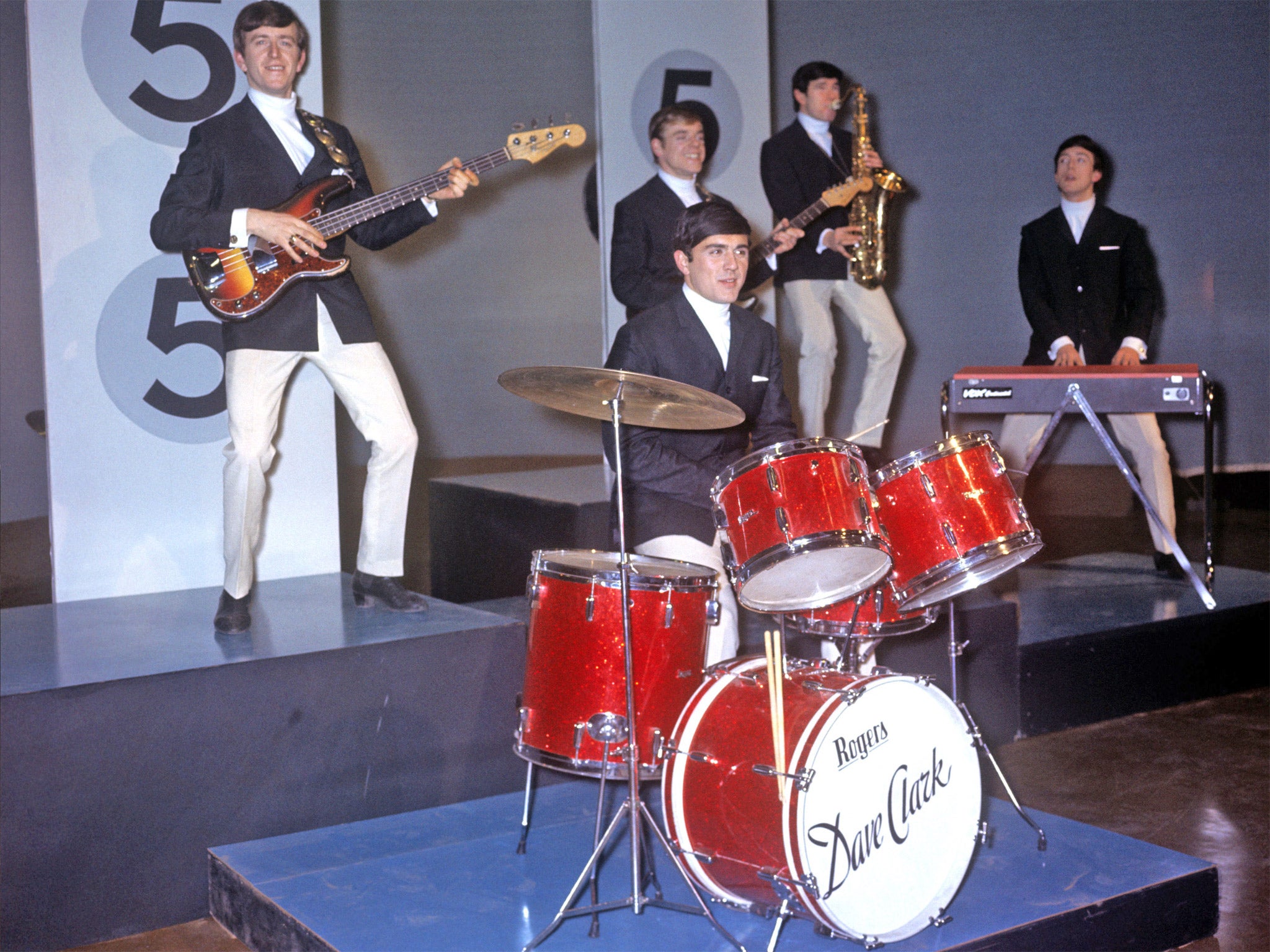
Your support helps us to tell the story
From reproductive rights to climate change to Big Tech, The Independent is on the ground when the story is developing. Whether it's investigating the financials of Elon Musk's pro-Trump PAC or producing our latest documentary, 'The A Word', which shines a light on the American women fighting for reproductive rights, we know how important it is to parse out the facts from the messaging.
At such a critical moment in US history, we need reporters on the ground. Your donation allows us to keep sending journalists to speak to both sides of the story.
The Independent is trusted by Americans across the entire political spectrum. And unlike many other quality news outlets, we choose not to lock Americans out of our reporting and analysis with paywalls. We believe quality journalism should be available to everyone, paid for by those who can afford it.
Your support makes all the difference.Although critically dismissed today, the Dave Clark Five was one of the most successful groups of the 1960s, having several UK hits and a following not far behind the Beatles' in America. Rick Huxley was part of the Dave Clark Five throughout their career and played bass on all their records, adding backing vocals when required.
The oldest member of the Dave Clark Five, Richard Huxley was born in Dartford in August 1942, the son of a publican. He played the guitar and when he left school at 16 answered an ad to join a beat group led by Dave Clark. Clark, no great musician himself but a brilliant organiser, knew how to pick competent players and by 1960 he had the line-up he wanted: himself on drums, Mike Smith (keyboards and lead vocals), Lenny Davidson (lead guitar), Huxley (bass) and Denis Payton (saxophone).
With a potent brand of pop and rhythm and blues, the Dave Clark Five found regular employment with Mecca Ballrooms. Huxley said that one of the tunes in their repertoire, "You Can't Sit Down", recorded by the Philip Upchurch Combo in Chicago in 1961, was the basis for their own trademark sound. Their two years with Mecca broadened their experience but their singles for Ember, Piccadilly and EMI's Columbia label only had limited success.
It was their sixth single, "Glad All Over", released in December 1963, which provided the breakthrough. The repetitive song, written by Clark and Smith, with its thunderous, thumping sound, soared up the charts, replacing "I Want To Hold Your Hand" at the top. Said Clark, "I knew that we needed a song with thumps in. We had been playing dance halls and we were getting a great audience response to the stomping things we were doing."
The press dubbed it "The Tottenham Sound", and the follow-up single, "Bits And Pieces", a No 2, was equally noisy and powerful. Some dance halls were reluctant to let the band play their hits as they feared that dancers would damage the floor.
Dave Clark wanted to emulate the success of the Beatles in America and the first of their 18 appearances on The Ed Sullivan Show came in March 1964. Sullivan warmed to their good-looking, clean-cut image, and indeed, they looked like the younger members of a yacht club with their blazers, tab-collared shirts and white trousers. Clark encouraged them to concentrate on the US market. They toured more extensively than the Beatles and released numerous singles for America only, having a No 1 with "Over And Over" in 1965.
Clark paid the band members a weekly salary and Smith told me in 1991 that he was happy that Clark had been making the decisions. "We didn't care," he said. "To us it was just a matter of enjoying ourselves. There were the Three Musketeers – Rick, Lenny and myself – and we were the three terrors who got up to a lot of mischief. We had water fights and caused havoc in hotels but it never got into the papers. I think that a lot of the other groups deliberately did outrageous things to get noticed, but we had the publicity anyway. We ate good food, had lots of fun and played the concerts: it was a good life." A publicity leaflet at the time states that Huxley liked peace and quiet and was only irritated by leaky ballpoints. The high living was perhaps not for him; his favourite food was tripe and onions.
Their film Catch Us If You Can (1965), directed by John Boorman and written by Peter Nichols, was very successful. Paradoxically, it was about a pop group trying to escape from commercial demands. Huxley had comedic talent and his role could have been expanded.
The group did show some versatility, in particular, with the ballad "Because" and the soulful "Come Home". When they appeared on the 1965 Royal Variety Performance they chose to perform the country hit, "Welcome To My World". The group had too much of a bubblegum image to become psychedelic in 1967, and despite hits with "Everybody Knows" (1967) and "Red Balloon" (1968), they disbanded in 1971.
For a time, Huxley worked for Vox amplifiers, but in 1973 he and a friend, Doug Jackson, opened their own music equipment store close to the Oval. In 1987 Huxley moved into electrical wholesale. He had smoked heavily and he suffered from emphysema. Payton died in 2006 and Smith in 2008, and Huxley's wife, Ann, in 2012.
Spencer Leigh
Richard Huxley, bass guitarist: born Dartford 5 August 1942; married Ann (died 2012); died 11 February 2013.
Join our commenting forum
Join thought-provoking conversations, follow other Independent readers and see their replies
Comments